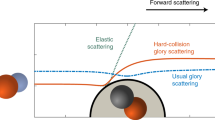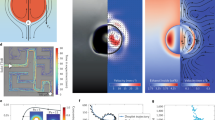Abstract
THE theory of kinetic activation has been shown by Hinshelwood to lead to a simple explanation of homogeneous bimolecular reactions (“Kinetics of Chemical Change in Gaseous Systems”, Oxf. Univ. Press). According to this view, two molecules react on collision when their joint kinetic energy at impact exceeds a certain limiting value E, termed the critical increment for the reaction. The number of binary impacts of this kind per second in a gas can be calculated by means of the kinetic theory as v22πσūn2e-E/RT where σ is the molecular diameter, ū the root mean square velocity, and n the number of particles per cubic centimetre. By comparing this expression with the actual number of molecules reacting, we can calculate the value of the critical increment E. Thus, if k is the velocity coefficient of a bimolecular reaction measured in gram molecules per minute per litre, we have 2v2πσ2ūn2e-E/RT = k. c2. %frac6.06.1023103.60; where C is the concentration of the reacting substance in gram molecules per litre.
This is a preview of subscription content, access via your institution
Access options
Subscribe to this journal
Receive 51 print issues and online access
$199.00 per year
only $3.90 per issue
Buy this article
- Purchase on Springer Link
- Instant access to full article PDF
Prices may be subject to local taxes which are calculated during checkout
Similar content being viewed by others
Author information
Authors and Affiliations
Rights and permissions
About this article
Cite this article
NORRISH, R. The Velocity Coefficient of a Homogeneous Bimolecular Gas Reaction. Nature 122, 923–924 (1928). https://doi.org/10.1038/122923b0
Issue Date:
DOI: https://doi.org/10.1038/122923b0
Comments
By submitting a comment you agree to abide by our Terms and Community Guidelines. If you find something abusive or that does not comply with our terms or guidelines please flag it as inappropriate.



